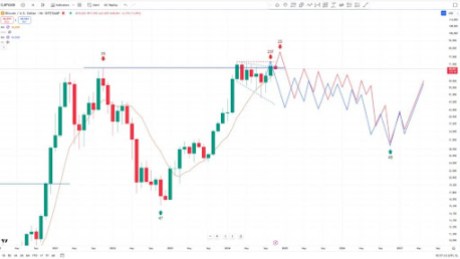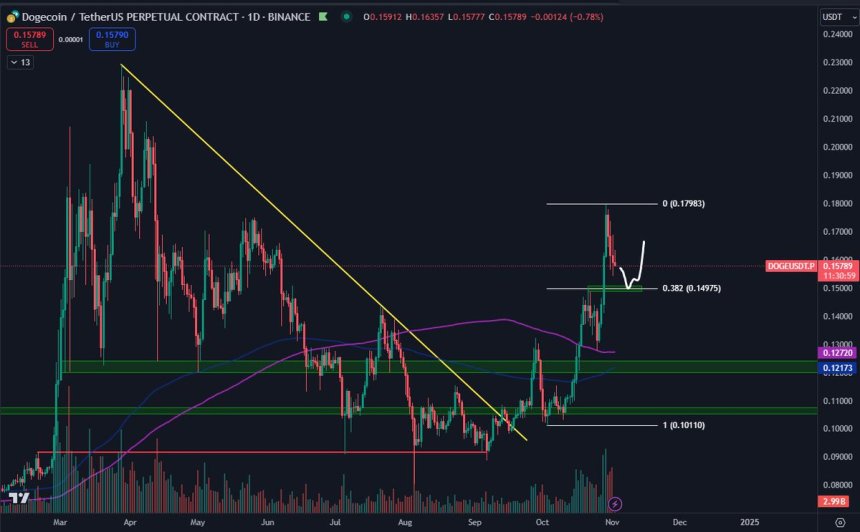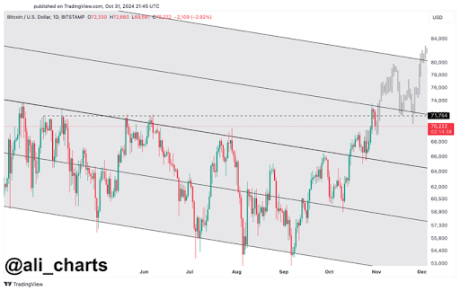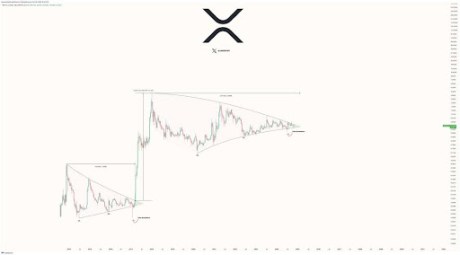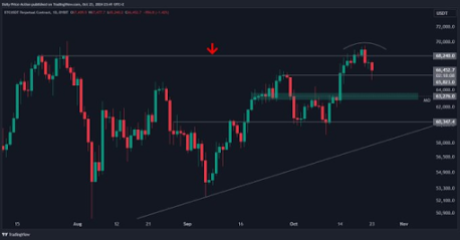November began with an unexpected downturn in the crypto market as Bitcoin, which had gone on a bull run in the last week of October, rapidly lost its momentum.
The highly anticipated “Moonvember” kicked off with an unexpected crash, plummeting from $73,000 on October 31 to $69,000 on November 1 to essentially wipe out $296 million in liquidations, with the majority of them being long positions. Despite the bulls managing to steady a Bitcoin price support at $69,000, the rapid downturn stirred questions among many crypto traders.
According to crypto expert Ash Crypto on social media platform X, this quick crash in the Bitcoin price can be attributed to four major factors.
According to Ash Crypto, the recent Bitcoin price isn’t a straightforward result of crypto-specific events but rather a reflection of the broader economic landscape. As he noted, there are currently multiple reports suggesting that Iran may be planning a military action against Israel from Iraqi territory. The potential escalation of conflict in the region seemed to have created uncertainty among Bitcoin investors, and many might have opted to exit from the markets.
“As we all know, war is bad for Bitcoin and crypto,” the analyst said.
Aside from the brewing conflict, Ash Crypto also highlighted the recent earnings reports from tech giants as another factor in the Bitcoin price crash. Major tech companies like Microsoft and Meta recently posted earnings reports that, despite beating expectations, showed rising AI-related costs. This led to a downturn in many other tech stocks, which spilled over to other financial markets, including the crypto industry.
Another factor Ash Crypto highlighted is the recent climb in US Treasury’s bond yields, specifically the 10-year note, which is now trading above 4.3%. Higher yields make government bonds a more attractive alternative, making investors less likely to invest in more volatile assets like cryptocurrencies.

Lastly, the latest Core Personal Consumption Expenditures (PCE) reading increased slightly above 2.7%. Ash Crypto noted that this rise in core inflation could push the Federal Reserve toward a more hawkish stance. This could lead to the Fed adopting higher interest rates or delaying rate cuts. Both scenarios could dampen demand for Bitcoin, which thrives in low interest rates, as shown by the September 18 interest rate cut.
Like many other crypto analysts, Ash Crypto remains confident that Bitcoin’s latest dip is only temporary. He drew parallels to October’s initial market dip, while anticipating that November, or “Moonvember,” will follow a similar trajectory. Interestingly, the analyst believes Bitcoin still has the momentum and market interest needed to push past $80,000 before the end of November.
At the time of writing, Bitcoin is trading at $69,678 and is up by 4% in the past 24 hours.
Featured image from Pexels, chart from TradingView
The highly anticipated “Moonvember” kicked off with an unexpected crash, plummeting from $73,000 on October 31 to $69,000 on November 1 to essentially wipe out $296 million in liquidations, with the majority of them being long positions. Despite the bulls managing to steady a Bitcoin price support at $69,000, the rapid downturn stirred questions among many crypto traders.
According to crypto expert Ash Crypto on social media platform X, this quick crash in the Bitcoin price can be attributed to four major factors.
Key Reasons Behind Bitcoin’s Price Drop
According to Ash Crypto, the recent Bitcoin price isn’t a straightforward result of crypto-specific events but rather a reflection of the broader economic landscape. As he noted, there are currently multiple reports suggesting that Iran may be planning a military action against Israel from Iraqi territory. The potential escalation of conflict in the region seemed to have created uncertainty among Bitcoin investors, and many might have opted to exit from the markets.
“As we all know, war is bad for Bitcoin and crypto,” the analyst said.
Aside from the brewing conflict, Ash Crypto also highlighted the recent earnings reports from tech giants as another factor in the Bitcoin price crash. Major tech companies like Microsoft and Meta recently posted earnings reports that, despite beating expectations, showed rising AI-related costs. This led to a downturn in many other tech stocks, which spilled over to other financial markets, including the crypto industry.
Another factor Ash Crypto highlighted is the recent climb in US Treasury’s bond yields, specifically the 10-year note, which is now trading above 4.3%. Higher yields make government bonds a more attractive alternative, making investors less likely to invest in more volatile assets like cryptocurrencies.
Lastly, the latest Core Personal Consumption Expenditures (PCE) reading increased slightly above 2.7%. Ash Crypto noted that this rise in core inflation could push the Federal Reserve toward a more hawkish stance. This could lead to the Fed adopting higher interest rates or delaying rate cuts. Both scenarios could dampen demand for Bitcoin, which thrives in low interest rates, as shown by the September 18 interest rate cut.
Looking Ahead: What’s Next For Bitcoin?
Like many other crypto analysts, Ash Crypto remains confident that Bitcoin’s latest dip is only temporary. He drew parallels to October’s initial market dip, while anticipating that November, or “Moonvember,” will follow a similar trajectory. Interestingly, the analyst believes Bitcoin still has the momentum and market interest needed to push past $80,000 before the end of November.
At the time of writing, Bitcoin is trading at $69,678 and is up by 4% in the past 24 hours.
Featured image from Pexels, chart from TradingView
